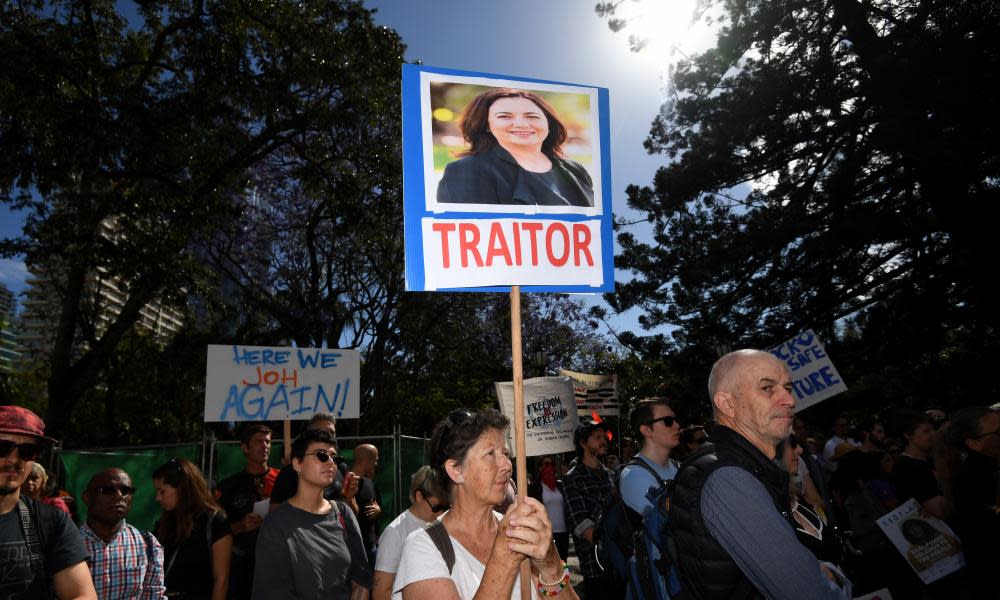Queensland anti-protest laws 'inherently disproportionate', UN human rights experts say

United Nations human rights experts have detailed “serious concerns” with anti-protest laws recently adopted in Queensland, which they say are “inherently disproportionate” and criminalise peaceful demonstrations.
The state passed laws in November to ban “locking devices” used by activists to delay their removal during acts of civil disobedience.
The legislation was justified on public safety grounds but many of the government’s public claims – including that climate change activists had laced the devices with traps and intended to cause harm – were not backed by any evidence.
Guardian Australia has detailed how the justifications were exaggerated and in one case based on an incident that occurred 14 years ago.
In a letter to the Australian government, four UN special rapporteurs on human rights outline concerns about the laws they say are at odds with international obligations.
They say the legislation “contains a number of provisions that unduly restrict the right to freedom of peaceful assembly and to freedom of expression”.
“We are concerned that the act could be used to unduly restrict the right to freedom of peaceful assembly,” the letter says.
“We are seriously concerned that the act allows for the criminalisation of peaceful protests that may entail blocking access to roads or buildings; acts of civil disobedience; and non-violent direct action.”
The letter says unclear definitions in legislation were also a cause for concern, including what might constitute “unreasonable interference” or a “reasonable excuse”.
Sign up to receive the top stories from Guardian Australia every morning
“We are mindful that the utilisation of attachment devices may in certain cases provoke legitimate concerns about public or personal safety,” the letter says.
“However, the act allows for such a general restriction on their use that it is inherently disproportionate and not precise enough to allow for the consideration of specific situations.
“Absolute or total prohibitions, whether on the exercise of the right in general or on the exercise of the right in certain places and at certain times, are inherently disproportionate, as they exclude consideration of special circumstances specific to each meeting.
“Further serious concern is expressed that the mandatory and disproportionate penalties could have a deterrent effect on the legitimate exercise of the right to peaceful assembly and the right to freedom of expression, silencing and punishing human rights defenders and any dissenters that hinder, obstruct or prevent a lawful activity.
The experts said the short time period for public scrutiny was also of concern.
The bill was opposed by unions, human rights lawyers and the Queensland human rights commissioner, who said the government had not sufficiently justified the need.
Emily Howie, the legal Director at the Human Rights Law Centre, said activists, including suffragettes, had used lock-on devices in Australia for decades.
“Disruptive protests may be frustrating for governments, but we must remember that because of them, we have the eight-hour work day and the right to vote for women,” Howie said.
“Instead of locking people up for blocking a footpath, the Queensland government should recommit to facilitating peaceful protest for the health of democracy.
The letter comes just days after Australia’s civil rights rating was downgraded from “open” to “narrowed”.
“The role of government is to facilitate that democratic participation, instead the trend we’re seeing is criminalising it.”
Earlier this year the Queensland premier, Annastacia Palaszczuk, claimed in parliament that protesters had used “sinister tactics” – cylinders containing glass fragments and gas containers “so that anyone trying to cut a protester free will be injured or worse.”
“Police will have the power to search those they reasonably suspect ... of having those devices. They will be illegal.
“Every single minute our [emergency services] spend dealing with these types of protesters is a minute they are spending not helping others. It will not be allowed to continue.”

 Yahoo News
Yahoo News 
